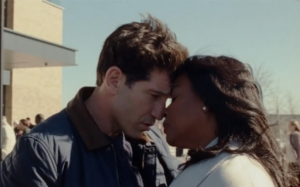CTV NEWSCHANNEL: MOVIE REVIEWS FOR SUNDAY JANUARY 20, 2024!
 I join CTV NewsChannel anchor Roger Peterson to have a look at the space thriller “I.S.S.,” the poignant “Memory” and the drama “Origin.”
I join CTV NewsChannel anchor Roger Peterson to have a look at the space thriller “I.S.S.,” the poignant “Memory” and the drama “Origin.”
Watch the whole thing HERE!
 I join CTV NewsChannel anchor Roger Peterson to have a look at the space thriller “I.S.S.,” the poignant “Memory” and the drama “Origin.”
I join CTV NewsChannel anchor Roger Peterson to have a look at the space thriller “I.S.S.,” the poignant “Memory” and the drama “Origin.”
Watch the whole thing HERE!
 I join “CTV News Toronto at Five” with host Natalie Johnson, to talk about the space thriller “I.S.S.,” the poignant “Memory” and the drama “Origin.”
I join “CTV News Toronto at Five” with host Natalie Johnson, to talk about the space thriller “I.S.S.,” the poignant “Memory” and the drama “Origin.”
Watch the whole thing HERE! (Starts at 13:06)
 I sit in with NewsTalk 1010 host Jim Richards on the coast-to-coast-to-coast late night “NewsTalk Tonight” to play the game “Did Richard Crouse Like This?” This week we talk about the space thriller “I.S.S.,” the poignant “Memory” and the drama “Origin.”
I sit in with NewsTalk 1010 host Jim Richards on the coast-to-coast-to-coast late night “NewsTalk Tonight” to play the game “Did Richard Crouse Like This?” This week we talk about the space thriller “I.S.S.,” the poignant “Memory” and the drama “Origin.”
Listen to the whole thing HERE!
 I join CP24 anchor Andrew Brennan to have a look at the space thriller “I.S.S.,” the poignant “Memory” and the drama “Origin.”
I join CP24 anchor Andrew Brennan to have a look at the space thriller “I.S.S.,” the poignant “Memory” and the drama “Origin.”
Watch the whole thing HERE!
 I sit in on the CFRA Ottawa morning show with host Bill Carroll to talk the new movies coming to theatres including the space thriller “I.S.S.,” the poignant “Memory” and the drama “Origin.”
I sit in on the CFRA Ottawa morning show with host Bill Carroll to talk the new movies coming to theatres including the space thriller “I.S.S.,” the poignant “Memory” and the drama “Origin.”
Listen to the whole thing HERE!
 Fast reviews for busy people! Watch as I review three movies in less time than it takes to pour a drink! Have a look as I race against the clock to tell you about the space thriller “I.S.S.,” the poignant “Memory” and the drama “Origin.”
Fast reviews for busy people! Watch as I review three movies in less time than it takes to pour a drink! Have a look as I race against the clock to tell you about the space thriller “I.S.S.,” the poignant “Memory” and the drama “Origin.”
Watch the whole thing HERE!
 Ambitious, audacious and just a little messy, “Origin,” the new film from director Ava DuVernay, now playing in theatres, is a study of the caste system told through the lens of a writer played by Aunjanue Ellis-Taylor. Part biography, part intellectual journey, it mixes the emotional with the academic.
Ambitious, audacious and just a little messy, “Origin,” the new film from director Ava DuVernay, now playing in theatres, is a study of the caste system told through the lens of a writer played by Aunjanue Ellis-Taylor. Part biography, part intellectual journey, it mixes the emotional with the academic.
Ellis-Taylor is bestselling author Isabel Wilkerson, who, in real life is the first woman of African-American heritage to win the Pulitzer Prize in journalism. Happily married to Brett (Jon Bernthal), she is considering taking some time off writing and lecturing to look after her aging and ailing mother.
But tragedy and her restless intellectual curiosity push her into exploring how the unspoken caste system has shaped America, and how people are still classified to this day by a pecking order of human classifications. To that end she travels the world and history, making stops in the American South, Berlin, and India to study which groups of people have power, and which do not.
Based on Wilkerson life and the writing of the book “Caste: The Origins of Our Discontents,” “Origin” is narrative film that feels stuck between two worlds. The blend of Wilkerson’s biography, mixed with dramatic re-creations of the historical events that feed into her research, is a mix of personal and the political, but it seems as if the film is trying to decide if it is a narrative or a documentary.
Still, the choppy presentation is chock full of thought-provoking ideas. DuVernay, who also wrote the script, crafts a unique movie about connectivity, one that isn’t afraid to swing for the fences. As the film skips through world history and Wilkerson’s life, a portrait of systemic subjugation eventually comes into focus, against a backdrop of personal loss. The film’s two prongs don’t feel like a natural fit, but Ellis-Taylor’s rock-solid performance anchors the film, providing a bridge between the emotional and intellectual.
“Origin” is an interesting movie, one that bristles with the spirit of discovery, but sometimes gets allows lucidity to get lost in its execution.
 Can Richard review three movies in just thirty seconds? Have a look as he races against the clock to tell you about “Ghostbusters: Afterlife,” “King Richard” and “The Power of the Dog.”
Can Richard review three movies in just thirty seconds? Have a look as he races against the clock to tell you about “Ghostbusters: Afterlife,” “King Richard” and “The Power of the Dog.”
Find out HERE!
 Richard speaks to “CTV News at Six” anchor Andria Case about the best movies and television to watch this weekend including the rebooted “Ghostbusters: Afterlife,” the fourth film in “Ghostbusters” franchise, the inspirational new Will Smith movie “King Richard” and Benedict Cumberbatch in “The Power of the Dog.”
Richard speaks to “CTV News at Six” anchor Andria Case about the best movies and television to watch this weekend including the rebooted “Ghostbusters: Afterlife,” the fourth film in “Ghostbusters” franchise, the inspirational new Will Smith movie “King Richard” and Benedict Cumberbatch in “The Power of the Dog.”
Watch the whole thing HERE! (Starts at 35.52)